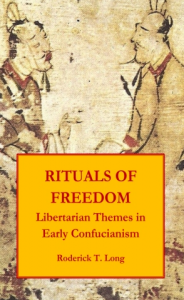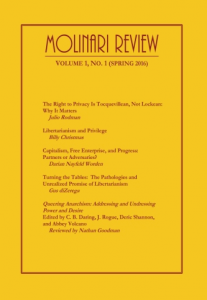VOLTAIRINE DE CLEYRE
PHILADELPHIA’S WOMAN ANARCHIST;
HER THEORIES AND VERSES
Offspring of a French communist and a New England Puritan Woman, She Was Born to Enthusiasm and Hobbies-Rabid in her Anarchism, and Believes in Unhappiness as Part of the Highest Ideal Life
Picture to yourself a tall woman – her age may be 26 years-with an oval face, pale as a student’s deep-set blue eyes, teeth white and even, a countenance grave far beyond her years save when a slow smile brightens it: picture this woman sitting opposite you, expounding calmly and clearly the doctrine of anarchy, and you are in the presence of Voltairine de Cleyre.
To the readers of newspapers the name is not a familiar one. Even among the Anarchists-that is, among the rank and file of those who attend the Anarchist meetings and listen in open-mouthed admiration to what the leaders have to say-it is not widely known. It is the name, however, of a young woman who is probably the cleverest Anarchist in this country, who, were she to work in that ostentatious fashion which seems to take well with Anarchists, might some day become their recognized leader.
A few months ago there was a meeting of Anarchists in this city to denounce the arrest and conviction of Emma Goldman, and among the speakers was Miss Voltairine de Cleyre. So eloquent a plea and so clever a speech as hers was had never been heard at a New York Anarchist meeting before.
“I have not a tongue of fire as Emma Goldman has,” she said. “I cannot stir the people. I must speak in my own cold way otherwise I would not be allowed to speak at all. But if I had the power,
Were I Brutus
And Brutus Anthony, there were an Antony
Would ruffle up your spirits, and put a tongue
In every wound of Caesar’s that should move
The stones of Rome to rise and mutiny.
“If therefore, I do not give you the advice which Emma Goldman gave you, let not the authorities supposed it is because I have any more respect for their Constitution and their law than she had or that I regard them as being right in the matter.”
The influence which such a speaker could have upon an inflammable-minded audience can easily be imagined. THE SUN sent a reporter to find this young woman and learn something of her history, but she had disappeared as suddenly and seemingly, as mysteriously as she had turned up. And although, as it now appears, she made no attempt to conceal herself, yet no one to whom THE SUN reporter applied during those two months could tell where she lived.
The other day, however, one of the Assistance District Attorneys of this county received a pamphlet, of which the title page read as follows “In Defence of Emma Goldman and the Right of Expropriation. By Voltairine de Cleyre. 3,515 Wallace street. Philadelphia.” The next day THE SUN representative called upon Miss de Cleyre.
A little room on the second floor of a typical Philadelphia cottage, filled with books and the odor of books, and ornamented with many strange shells and dried starfishes, is Miss de Cleyre’s study. “Tell me what books you read and I will tell you what you are,” some sage one said. A glance at Miss de Cleyre’s library tells more eloquently than an elaborate essay could what Miss de Cleyre is.
Proudhon, Karl Marx, Ferdinand Lassalle, Adam Smith, Aristotle, Spinoza, and Conte stand shoulder to shoulder upon the shelves of her study, a silent index to her character.
At a writing table, upon which stood a portrait of Victor Hugo facing a glass globe full of water, in which little goldfishes were swimming, sat Miss de Cleyre.
“So you have come all the way from New York to interview me,” she said. “Now what can I say to you?”
Indeed, when he sat face to face with this young woman, and saw that she had bright eyes and that she was comely and young and very womanly in her appearance and her manner, the reporter found it difficult to concentrate his mind upon the fact that here was an Anarchist of the most radical type.
“Supposing you begin with yourself.”
She smiled-the slow, calm smile of a woman who does not smile often.
“Born in the year so-and-so, which of course you do not want to know-Voltairine de Cleyre is one of the most rabid Anarchists of this country.” That’s the way your story will begin. I’ll probably start off like that too, if you like, is that what you want? I see by your face that you are disgusted. Don’t mind telling me if you are, I like people who are outspoken, even if what they say is not flattering.”
“How did you ever take to anarchism?”
“Well, I supposed it was born in me, although I did not know of it until certain circumstances brought it out.”
She spoke very slowly, selecting each word with care, and concentrating her attention upon her answer as though she feared to make a misstatement.
“My father was a French Communist and my mother a New England Puritan, and you might know that the offspring of such a union was sure to become enthusiastic over something or other. I was born in Michigan, where I went to school. Even as a schoolgirl I devoted considerable attention to some of the subjects which interest me now, and although I had but ill-defined ideas, they were the foundation for my subsequent studies.
“When I left college I was a free thinker, and I delivered a series of lectures upon free thought. I had always been interested in the relation of the sexes, and after leaving college I devoted a great deal of thought to the subject. About six years ago, while I was delivering a lecture on free thought in Linesville, Pa., I met a Chicago lawyer whose name was C.S. Darrow. He attended one of my lectures and I became acquainted with him. A short time after that I heard him lecture on socialism, and in fifteen minutes I was a socialist.
“I remained a Socialist for about six weeks, and then I found the true solution of the social problem. I became an Anarchist. It was customary at our meetings to have short discussions in which anyone in the audience could join if he wanted. Among the regular visitors there was a jeweler named Morzersky, who was a communistic Anarchist. He frequently spoke at these meetings in favor of anarchism, using the Socratic method in his reasoning.
He took advantage of my own arguments to push me into a corner and make me admit that I was all wrong. I had many long talks with him, in which I stood up for socialism and he for anarchism-authority versus individual liberty. He could never convince me of the truth of communism, but what he told me induced me to study anarchism as a science. I read Stephen Pearl Andrew’s ‘Science of Society,” Lysander Spooner’s letter to Grover Cleveland, and Proudhon’s, “What is Property?” and gradually I became an Anarchist.”
“When did you begin to lecture?”
“I have never been what is commonly called an agitator, not that I have not been wiling to become one, but because I have not the ability. To become an agitator one must be able to speak without much preparation. My speeches must always be prepared, and it takes me quite a long while to prepare them. I don’t care much for extemporaneous speakers. Their speeches are disconnected and badly arranged as a rule.
“I have not lectured often on anarchism although my anarchist ideas have influenced my views on every other subject. I look at everything through anarchistic spectacles.”
“Upon what other subjects do you lecture?”
“I have lectured on ethics, although of course my anarchism is as much a system of ethics as it is a system of economy; on religion, in which I am a free thinker, on the race question in relation to the development of society and on the woman question. I have delivered more lectures on the woman question than anything else.”
“And what are your ideas on that question?”
Miss de Cleyre smoothed her dress, placed her hands on her hips and answered with considerable animation:
“I believe that woman is the equal of man and should have all of the privileges which he receives. I do not stop to fuss with the question of franchise. I do not believe in the ballot either for men or for women. I believe in the equality of woman as a worker, a thinker, and as an individual. She should have the right to own property and not be interfered with by her own husband.”
She hesitated for a moment and then, leaning slightly forward with her hands-clasped in her lap, her face animated she went on speaking quickly and with considerable fire:
“Yes, the earth is a prison, the marriage bed is a cell, women are the prisoners and you men are the keepers. A man’s wife is his property. His will is her law. She has no rights. Her mind must be subservient to his, her body is his, her soul, if she has a soul, is his. The wedding ceremony makes her his slave. A prostitute is better off than she. She must submit to her husband whether or no.
“And I am opposed to this. I do not think it is right. I believe the wife should have exactly the same rights as her husband. Women should enjoy themselves in life as men do. A woman should be as free to dispose of her property and her children as her husband is.
“But oh! they are ignorant. They are all ignorant, ignorant, ignorant. they have not the intelligence to be unhappy. They do not feel their own misery.”
“And do you think that people who have sense are unhappy.”
“Yes. The more sense they have the unhappier they are. But then I do not think that happiness is the object of life. I do not think that we should devote ourselves to being happy.”
“What do you think is the object of life?”
“Progress. The development of the human race. I want people to know more. If in their search for knowledge they meet with unhappiness, it is a good thing. If they meet with unhappiness, it is their fate. They cannot escape it. It is true I am a pessimist, but I do not think we were meant to be happy. We are merely the cogs in the wheel of a mighty evolution, which moves around slowly and steadily until its work is over.”
“And what will happen then?”
“Ah, that is the great goal of the race. What it will be, no one can tell. As the human race progresses and becomes perfect I think it susceptibility to unhappiness will become keener. Conditions that do not exist to-day, or, if they did exist, we would look upon the indifference, will add to the unhappiness of the race in the future. As I said before, the progress that I believe in, is not toward a happier life. It it is towards a perfect, an ideal life, in which men and women will be as gods, with a gods power to enjoy and to suffer.
It may be that this progress will merely be a race for unhappiness and the sufferings of one generation may increase the sufferings of the next. But they will make it easier for those that come after them to strive for that goal to which, even without their cooperation, the great, unconscious forces impelling human kind. Here, I will show you a little poem I once wrote in which I expressed my idea better than I can do it now.”
The poem which she produced read as follows:
A Soul, half through the Gate, said unto Life:
“What dos thou offer me?” And Life replied:
“Sorrow, unceasing struggle, disappointment;
after these
Darkness and silence.” The Soul said unto Death:
“What dos thou offer me?” And Death replied:
“In the beginning what Life gives at last.”
Turning to Life: “And if I live and struggle?”
“Others shall live and struggle after thee
Counting it easier where thou hast passed.”
“And by their struggles?” “Easier place shall be
For others, still to rise to keener pain
Of conquering Agony!” “and what have I
To do with all these others? Who are they?”
“Yourself!” “And all who went before?” “Yourself.”
“The darkness and the silence, too, have end?”
“They end in light and sound; peace ends in pain,
Death ends in Me, and thou must glide from
Self
To Self, as light to shade and shade to light again.
Choose!” The Soul, sighing, answered: “I will live.”
“Sometimes I think,” she went on, that it will all end in a great cataclysm of nature. At other times, when I am in one of my rare, optimistic moods, I have faith, just like a Christian, and believe that there will be a better and a nobler life for the generations that are to come long after we have returned to dust.
“Let me say here in fairness that these are only my own views. They are not the principles of anarchism. Most of the Anarchists are egoists, believing that happiness is the main object of life. In that I differ with them. I also believe in property, not as a theory or a principle, but as an established fact. There must be property. The world cannot exist a day without it.
“Another point on which I disagree with my fellow-Anarchists is in the theory of the administration of justice. They believe that justice should be administered by societies organized for that purpose. My theory is that of Jesus Christ: If a man smite you upon the right cheek, turn him the left. I do not believe in the administration of justice. I think that when we realize the ideal state there will be no need to administer justice. It will administer itself. When a man cannot profit by stolen goods, he will not steal.”
“Do you write much poetry?”
“Yes, I have written considerable verse. I will give you, if you like, a copy of some of the things I have written.”
That ended the interview. Miss de Cleyre gave the reporter some specimens of her poetry and prose writings, some of which had appeared in the periodicals, but most of which she had published herself. the style of her poetry reminds one strongly of that of a well-known “poetess of passion.” One of her poems, entitled “His Confession,” describes a man telling his sweetheart how he succumbed to temptation, after he parted with her one the previous night. The climax runs as follows:
Just as I reached the open, where the moon light fell broad and wide,
A woman’s figure in rustling robes floated out from the other side.
A woman-you do not know her-have probably never seen –
She was I;as a forest panther, stately and tall as a queen;
And her dress, a shimmering golden gauze, fell round her figure slim
Like a tissue of woven moonlight, revealing each sculptured limb;
And her eyes were like light beyond a light, dim ‘neath
a drooping lid,
Fiery and humid and soft and fierce, bidding what they
they forbid;
And her mouth was red, where a wondrous smile lay
on it like a wreath
Hinting the kisses that in it lay, and the passion of
strong, white teeth.
She held out a warm small hand to me, with a little
silvery laugh
Like bacchanal belie that scattered my dreams of you
like chaff.
A maddening, sweet aroma stole over my senses then
And I kissed her, kissed her, kissed her, over and
again.
What did I think or remember, what did I know or
care.
As I panted, trembling, tangled in with the tawn of
her tig’rish hair;
I was drun with the wine of her lingering hips, with
the fume of her burning sighs.
I was drowning in the luminous languer that lay in her
leonine eyes.
And the world was forgot, and heaven forgot, and God
was forgot, and you-
Passion was a master, and I its slave-the False set its
heel on the True
I had fallen, without a struggle, at the first touch of
Lust’s red brands
Had flund the years to the winds, and took this Dead-
Sea fruit in my hands.
For the kiss of a beautiful animal I had bartered a
noble love.
For the hand of a saint had taken the scene of a leman’s love:
Her other poems on love run in the same strain. She has also written a pamphlet on “Sex Slavery” and a sonnet to Gov. Altgeldt for having pardoned the Anarchists.










